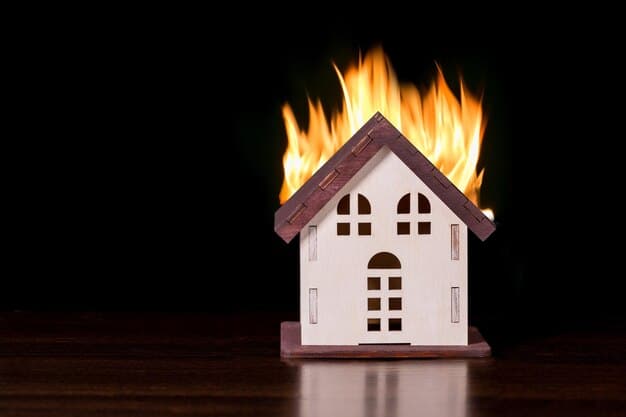Fire insurance is a specific type of property insurance that covers damage or destruction caused by fire. It can protect homes, businesses, and other properties, providing financial compensation in the event that a fire causes damage to the structure of a property or to its contents. Fire insurance policies may also be included in broader homeowner’s or commercial property insurance policies, but can also be purchased separately, depending on your needs and the level of protection you require.
Whether you’re a homeowner, a renter, or a business owner, understanding fire insurance and why you need it is crucial to ensuring the safety and protection of your property and assets. In this article, we will delve into the basics of fire insurance, its importance, how it works, and how to choose the right policy to meet your needs.
Key Takeaways
- Fire insurance protects against the financial loss caused by fire damage to property and belongings.
- Fire insurance is crucial for homeowners, renters, and business owners, providing peace of mind and financial protection.
- It covers structural damage, personal property, additional living expenses, and loss of business income.
- Fire insurance policies vary, so it’s essential to choose the right coverage based on property value, type, and specific risks.
- Always check the policy limits, deductibles, and exclusions to ensure adequate coverage for your needs.
Also Read : Best Practices For Avoiding Skincare Pilling
What Is Fire Insurance?
Fire insurance is designed to cover losses caused by fire damage. This includes protection for the physical structure of your property (such as your home, office, or business premises) and the belongings inside it (like furniture, electronics, and other personal property). Fire insurance policies are intended to help property owners rebuild or repair their homes or businesses after a fire and replace the possessions that are lost or destroyed.
Also Read : What Is Commercial Property Insurance And Why Do You Need It?
Fire insurance typically covers damage from a range of causes, including electrical faults, lightning strikes, arson (in some cases), wildfires, and accidental fires. However, fire insurance does not usually cover damages from natural disasters like floods or earthquakes unless specific riders or additional coverage are added to the policy.
Fire insurance is commonly included in homeowners insurance and commercial property insurance packages. For business owners, it is often a critical part of protecting their premises, inventory, and operations. In high-risk areas, such as locations prone to wildfires or lightning strikes, property owners may also seek specialized fire insurance policies to ensure they have adequate coverage.
Also Read : Best Whole Life Insurance For Long Term Benefits
Why Do You Need Fire Insurance?

There are several key reasons why fire insurance is important for both homeowners and business owners.
Also Read : What Is HealthStream And How Does It Work?
Protection Against Financial Losses Fires can cause devastating damage to homes and businesses. In many cases, fire damage is not only limited to the structure of the property but also to the belongings inside, including furniture, electronics, and valuable possessions. Without fire insurance, the costs of repairing or rebuilding property, and replacing personal belongings, would fall entirely on the policyholder. The cost of rebuilding can be astronomical, especially if the damage is extensive. Fire insurance helps to alleviate the financial burden by covering repair or rebuilding expenses, as well as the replacement of lost or damaged personal property.
Protection for Personal Belongings When a fire occurs, everything inside your home or business can be lost in a matter of hours. Fire insurance covers the replacement of personal property such as clothing, furniture, appliances, and electronics. Depending on your policy, it may also cover valuables like jewelry, artwork, and collectibles. For business owners, fire insurance may cover inventory, equipment, and other assets critical to the operations of the business.
Also Read : What Are The Key Fields In Health Science?
Peace of Mind Knowing that you have fire insurance provides peace of mind. Whether you are at home, at work, or on vacation, having insurance ensures that you’re financially protected in case of a fire. This peace of mind reduces anxiety, allowing you to go about your day knowing that you won’t be financially devastated by a potential disaster. It’s comforting to know that if your property is damaged by fire, you won’t have to bear the entire financial burden on your own.
Required for Mortgages and Loans In many cases, lenders and mortgage providers require property owners to have fire insurance before approving a loan. The insurance protects the lender’s investment in case of fire damage to the property. Fire insurance guarantees that the loan will be repaid, even if the home or property is destroyed. If you’re purchasing a home with a mortgage, your lender will likely require proof of fire insurance before finalizing the loan agreement.
Business Protection For business owners, fire insurance is critical to ensure that the physical property and assets are protected. A fire can result in the complete loss of business inventory, equipment, and valuable documents. The damage caused by fire can also disrupt day-to-day operations, leading to income loss and potentially halting business activities for weeks or even months. Fire insurance can help cover the costs of rebuilding your business, replacing inventory, and compensating for lost income while repairs are being made. This coverage helps ensure your business can recover from a disaster and continue operating.
Legal Liability Protection In some cases, fire insurance policies can also protect you from legal liability if a fire spreads and damages neighboring properties. For example, if a fire in your home causes damage to a neighboring home or business, your fire insurance may help cover the costs of repairs or settlements. Legal expenses related to lawsuits or third-party claims can be extremely costly, so having fire insurance can protect you from being financially responsible for such expenses.
Protection Against Fire-Related Events Certain fire insurance policies may provide protection against other fire-related events, including natural disasters like wildfires or lightning strikes. These risks are often more prevalent in some areas and may require additional coverage. Fire insurance policies can be tailored to meet the specific needs of homeowners, renters, or business owners based on their location and the level of risk associated with fires.
What Does Fire Insurance Cover?
The coverage provided by fire insurance can vary depending on the specific policy, insurer, and type of property insured. However, most fire insurance policies generally cover:
Structural Damage
Fire insurance typically covers the cost of repairing or rebuilding the structure of a property that has been damaged or destroyed by fire. This can include walls, roofs, floors, and foundations. The policy will pay to restore the property to its pre-fire condition, or in some cases, cover the costs of rebuilding the property.
Personal Property
Fire insurance covers the replacement or repair of personal property that is damaged or destroyed by fire. This can include furniture, electronics, appliances, clothing, and other possessions. Some policies also cover valuables like jewelry, artwork, and collectibles, but it’s important to check the specifics of your policy to ensure full coverage.
Additional Living Expenses

If your home or business is rendered uninhabitable due to fire damage, some fire insurance policies cover additional living expenses, such as the cost of staying in a hotel or renting a temporary residence. This coverage helps ensure that you are not financially burdened by the cost of relocation while your home is being repaired.
Loss of Business Income
For businesses, fire insurance may include coverage for the loss of income caused by fire-related disruptions. If your business has to close temporarily due to fire damage, fire insurance can compensate for the income lost during the period of rebuilding.
Firefighting Expenses
Some fire insurance policies cover the costs of firefighting efforts, including water damage or foam used to extinguish the fire. These additional expenses can add up, especially if the fire was extensive, and having this coverage can help offset the costs of firefighting services.
Third-Party Liability

In the event that your fire damages neighboring properties, fire insurance may also cover third-party liability. This protects you from legal expenses or damage claims from people whose property was affected by your fire.
How to Choose the Right Fire Insurance
When selecting fire insurance, it’s important to consider several factors to ensure you get the right coverage for your needs. Here are some key considerations:
Value of Your Property
Start by calculating the total value of your property, including the structure of your home or business and the value of your personal belongings. This will help you determine the amount of coverage needed to replace or rebuild in the event of a fire.
Type of Property
Different types of properties may require different types of coverage. For example, residential properties may need different protections than commercial properties. Be sure to choose a policy that matches the specifics of your property, whether it’s a house, apartment, or business premises.
Policy Limits and Deductibles
Check the policy limits to ensure they provide enough coverage to rebuild or replace your property and belongings. Keep in mind that higher limits typically result in higher premiums. You’ll also need to decide on your deductible—the amount you’ll pay out of pocket before the insurance kicks in. Make sure you choose a deductible that you can afford.
Additional Coverage
Consider adding coverage for risks that might not be included in a standard fire insurance policy, such as coverage for earthquakes, floods, or wildfires, depending on where you live.
Reputation of the Insurance Provider
It’s important to choose an insurance provider with a strong reputation for customer service and reliability. Look for insurers that offer 24/7 claims assistance, quick response times, and fair payout processes.
Also Read: Car Leasing With Insurance Deals Simplified
Conclusion
Fire insurance is an essential safeguard for homeowners, renters, and business owners. It provides critical financial protection against the devastating effects of fire damage, helping you rebuild, replace lost property, and recover lost income. Whether included in a broader insurance policy or purchased as a standalone policy, fire insurance ensures that you are protected from one of the most destructive risks to your property.
Having the right fire insurance coverage gives you peace of mind, knowing that you can recover from a disaster and move forward without the financial burden. Make sure to carefully assess your coverage needs and choose a policy that fits your budget and the value of your property. Ultimately, fire insurance can be a lifesaver in times of crisis, offering the financial support needed to rebuild and recover.
FAQs
What is the difference between fire insurance and homeowners insurance?
Homeowners insurance typically includes coverage for fire damage, along with other perils such as theft, vandalism, or natural disasters. Fire insurance specifically covers damage caused by fire, but homeowners insurance will often cover a broader range of risks.
Does fire insurance cover smoke damage?
Yes, most fire insurance policies also cover smoke damage. If a fire causes smoke damage to your property or belongings, it will generally be included in the fire insurance coverage.
Are businesses required to have fire insurance?
While fire insurance is not typically mandated by law for businesses, most landlords and lenders require it. Additionally, having fire insurance is crucial to protecting your business’s assets and continuity in case of a fire.
Does fire insurance cover arson?
Fire insurance policies may cover damage caused by arson, but only if it is not determined to be intentional on the part of the policyholder. If a fire is deliberately set by the property owner, the claim will likely be denied.
How much fire insurance do I need?
The amount of fire insurance you need depends on the value of your property and belongings. You should purchase enough coverage to fully rebuild or replace your home and possessions, including any potential costs associated with temporary housing.
Can I get fire insurance if I live in a high-risk area?
Yes, you can get fire insurance if you live in a high-risk area, but it may be more expensive. In some cases, you may need to purchase additional coverage, such as wildfire insurance, depending on your location.
What should I do if my property is damaged by fire?
If your property is damaged by fire, contact your insurance company immediately to report the damage. Document the damage with photos, and avoid making repairs until an insurance adjuster has inspected the site.





